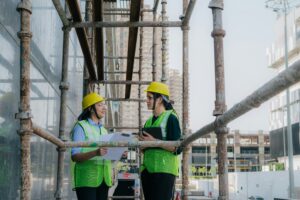The Importance of Stakeholder Communication in Retail Construction Projects


Retail construction projects, from building new stores to renovating existing ones, are complex endeavors requiring multiple stakeholders’ involvement. Effective communication among these stakeholders is crucial for the success of the project. In retail construction, stakeholders can include the property owners, contractors, architects, project managers, suppliers, local authorities, and, most importantly, the customers who will use the retail space. Each group plays a unique role, and clear, transparent communication helps ensure the smooth progress of the project, avoids costly delays, and leads to a higher-quality end product. This article will delve into the importance of stakeholder communication and how it can make or break retail construction projects.
Clear Expectations for All Parties Involved
Retail construction often involves numerous phases, from initial design and planning to final construction and handover. Each stakeholder must understand their role, responsibilities, and deliverables at each process stage. If expectations are not communicated, misunderstandings can arise, leading to delays or costly changes to the project.
For example, contractors need to understand the specific requirements of the architect and the retail brand. If these requirements are not communicated effectively, the contractor may deliver work that does not align with the brand’s vision. Similarly, project owners and developers must communicate budget constraints to contractors and suppliers to avoid overspending. Clear communication ensures everyone is on the same page and working toward a common goal.
Minimizing Delays and Cost Overruns
Delays and cost overruns are common challenges in any construction project, and retail construction is no exception. These issues can often be traced to poor communication or a lack of timely updates between stakeholders. Regular communication between project managers, contractors, and suppliers ensures potential problems are identified and addressed early.This proactive approach helps minimize disruptions and ensures the project stays on track.
Building Trust and Long-Term Relationships
Effective stakeholder communication is not just about ensuring a project runs smoothly; it also plays a key role in building trust and fostering long-term relationships. Retail construction projects often involve repeat business, especially with contractors, suppliers, and architects who may work on multiple projects for the same retail brand or developer.
Trust between stakeholders is also crucial for resolving conflicts. In any construction project, disagreements are bound to arise. When communication is open and transparent, stakeholders are more likely to approach conflicts with a problem-solving mindset rather than viewing them as obstacles. Having a history of positive communication makes it easier to navigate challenges, as all parties feel more confident that their concerns will be heard and addressed relatively.
Enhancing Efficiency and Decision-Making
Another critical aspect of stakeholder communication is its impact on decision-making and efficiency. Retail construction projects typically involve tight deadlines, and quick decision-making is often necessary to keep things moving forward. When stakeholders communicate effectively, they can make decisions more quickly, avoiding bottlenecks that can slow down the project.
For instance, a well-informed project manager can adjust on the fly, whether selecting a new supplier or altering the timeline due to unforeseen circumstances. Access to real-time updates and information from all stakeholders ensures that decisions are based on the most accurate data available, reducing the likelihood of mistakes or costly delays.
Legal and Regulatory Compliance
Communication is also essential for ensuring legal and regulatory compliance throughout the project. Retail construction projects are subject to local, state, and federal regulations. Stakeholders must know these requirements to avoid fines, work stoppages, or other legal complications. Failure to meet regulatory requirements can cause significant delays and even halt the project.
Customer-Centric Approach
Ultimately, any retail construction project aims to deliver a space that meets the needs of the retail business and its customers. Effective communication with the retail brand, designers, and construction teams helps ensure the space is functional, aesthetically appealing, and aligned with the brand’s values.
Retailers often have specific requirements for the space’s layout, design, and functionality, and these must be communicated to the construction team clearly and accurately. In addition, customer feedback on existing store layouts or designs can provide valuable insights that influence the project’s direction.
In retail construction projects, stakeholder communication is not a luxury but a necessity. From setting clear expectations to minimizing delays and cost overruns, transparent communication ensures that all parties are aligned and working together to achieve the project’s goals. Strong communication builds trust, improves efficiency, and fosters long-term relationships that can lead to future business opportunities. Effective stakeholder communication is key to the success of retail construction projects. Ensuring that these projects are completed on time, within budget, and to the satisfaction of all involved is crucial.
